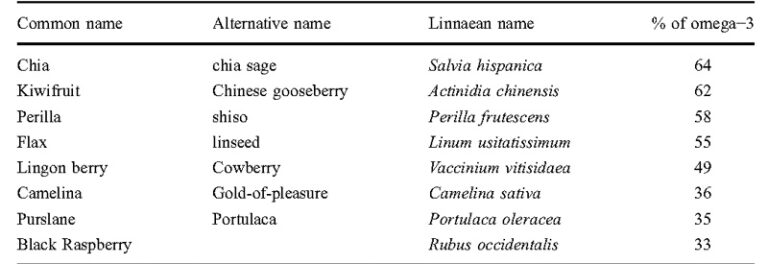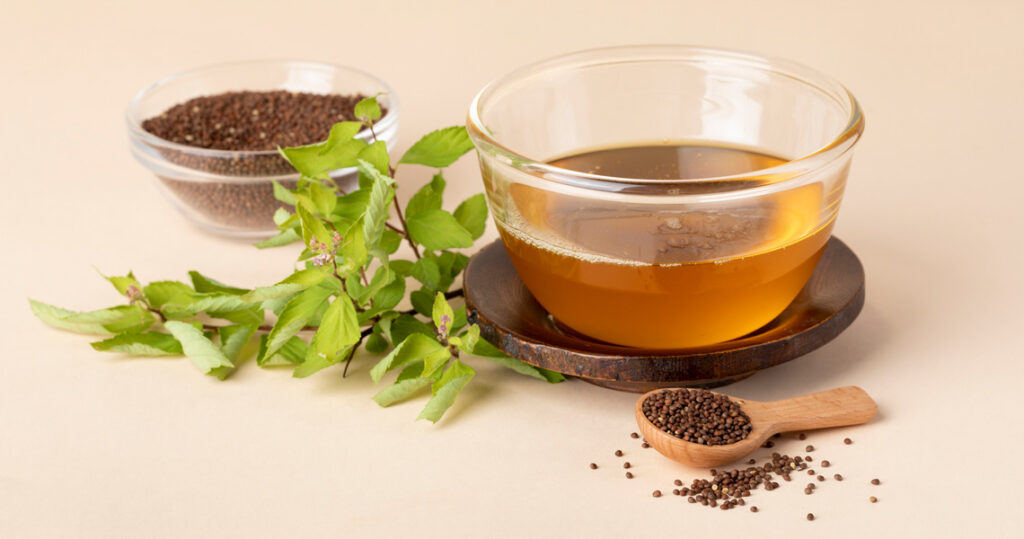If you have ever searched for supplements of omega-3 fatty acids, fish oil is definitely on the top list. No wonder fish oil offers the highest available dose of omega-3s, as it contains both eicosapentaenoic acid (EPA) and docosahexaenoic acid (DHA).
But, if you are looking for a plant-based source, things might get confusing. You can see other oilseeds such as flaxseed, sunflower, or pumpkin seed becoming popular exclusively because of their high-cost advertisements. If you are wise enough not to fall victim to such ads, looking out for the best source and ratios of omega-3s and omega-6s can become stressful.
The Japanese folklore about perilla
Perilla frutescens (Egoma Oil) is a herb belonging to the mint family Lamiaceae, native to Eastern Asia. It is often known as wild sesame, Shiso, Japanese mint, and Chinese basil. Perilla is used as a culinary and medicinal herb in many parts of Asia.
In Japan, there is a belief that eating perilla, traditionally known as egoma, will make you live ten years longer. Hence perilla is also called juunen, which literally means ten years. It is also one of the secret ingredients of centenarians.
Perilla seeds and their oils have been widely used traditionally and medicinally for thousands of years. The Asian herbalists have used it to treat various ailments, including cough and lung afflictions, asthma, seafood poisoning, and indigestion. Like other botanicals, this herb contains strong antibacterial and antioxidant properties.
The aromatic leaves of perilla are well-known in parts of the Far East. These leaves are typically eaten with grilled meat or added to kimchi in South Korea. In the Tohoku region and other areas, local cuisine uses perilla miso, a mix of ground-up perilla seeds, miso, and other ingredients, which has long been a staple. Also, in Vietnam, it is served as a fragrant garnish to noodle soups and spring rolls.
The Japanese folklore about perilla
Perilla seed oil is a good source of unsaturated, plant-based omega-3 fatty acids, which our bodies cannot synthesize. The essential fat acid, omega-3s, in foods include eicosapentaenoic acid (EPA) and docosahexaenoic acid (DHA), as well as their essential precursor alpha-linolenic acid (ALA).
Diet high in omega-3s, specifically ALA, stimulates cardioprotective effects by prompting vascular anti-inflammatory effects. This fact highlights the potentially important role of ALA in cardiovascular disease risk reduction.
ALA has been shown to reduce inflammation and may help prevent chronic diseases, such as skin diseases and arthritis. It is also beneficial for brain health and development.
https://pubmed.ncbi.nlm.nih.gov/15330276/
https://academic.oup.com/jn/article/134/11/2991/4688439
The omega-3 fatty acid is not the only aspect to look for in oils
When choosing plant oils, you should not miss checking the balance between omega-3, omega-6, and omega-9 fatty acids. The oils containing the highest amount of omega-3s would be most likely to promote health. In modern diets, omega-6 fatty acids are present in excessive amounts, and omega-3 fatty acids are deficient.
Perilla and flaxseed oil fall under the highest sources in omega-3 fatty acids. Any amount of omega-9 is beneficial, but in balancing these fatty acids, the omega-3 component is the most important.
While omega-3s are beneficial for cardiovascular health, certain types of cancers, and the immune system, omega-6s have different roles. The omega-6s enter the cell membranes, where the cellular machinery converts them into substances that promote abnormal clotting and increase inflammation. In recent years, it has been reported that the imbalance between omega-6 and omega-3 is one of the causes of allergic and lifestyle-related diseases.

Omega−3 content as the percentage of ALA in the seed oil (Source: Wikipedia)
Among plant sources of oil, perilla contains the highest proportion of omega-3 fatty acids (as alpha-linolenic acid), being in the 54-65% range and omega-6 (as linoleic acid) being in the 14-20% range. This unusual n6:n3 ratio of perilla makes it potential for an alternative to seed oils.
Kurowska EM, et al. Bioavailability of omega-3 essential fatty acids from perilla seed oil. Prostaglandins Leukot Essent Fatty Acids. (2003)
Comparison of perilla seed oil with fish oil
Studies show that omega-3s, particularly EPA and DHA found in fish oil, prevent cardiovascular diseases. In contrast, perilla seed oil only contains ALA as omega-3 fatty acids. However, later on, it metabolizes to give EPA and DHA.
The oily fish can potentially contain heavy metals and fat-soluble pollutants like PCBs and dioxin, which might accumulate in the fat cells. Hence, consumers of fish and their oils should be aware of it. Perilla seed oil is free from these organic pollutants. The consumption of perilla seed oil is wholesome, not only because of its ALA content but also for its antioxidant level.
Perilla seed oil is the best substitute for fish oil and is viable for vegetarians and vegans. Moreover, those who dislike the taste of fish, have a fish allergy or are just unable to tolerate fish oil due to reflux, can preferably take perilla seed oil for an omega-3 alternative.
You should not heat Perilla seed oil
Oils high in essential fatty acids, such as perilla seed oil, should not be heated in high temperatures because heat can decrease the stability and quality. Exposure to high heat can also cause the formation of trans-fats. It is thus not recommended to cook with oil rich in omega-3 fatty acids.
Also, due to commercial processing, the essential fatty acids in perilla seed oil can get denatured as it is heated in high temperatures for the refining process.
The traditional methods for the extraction of perilla seed oil involve pressing the oil out of seeds by applying pressure without heating them up or at low temperatures, which does not affect the nutritional value.
Our Egoma Oil contains 100% pure cold-pressed perilla seed oil exclusively processed in Japan with no added antioxidant. Considering its heat stability and usage, we have made it even more convenient by packaging it in a single-use sachet.
You can now preserve the omega-3 fatty acids on perilla seed oil by consuming it fresh as a part of salads or adding it directly to your lunch or desserts!
Read more at: https://makiselifeup.com/product/perilla-seed-oil/
The secret oil of the east
Perilla seed oil is truly the hidden ingredient of the east, and its pharmacological, nutritional, and health benefits are even less known. It contains a variety of beneficial phytochemicals, phytosterols, tocopherols, and compounds such as rosmarinic acid, caffeic acid, ferulic acid, and luteolin.
These compounds confer cardiovascular benefits, anticancer properties and support healthy immune function. Perilla seed oil also suppresses the production of chemical mediators in the allergy and inflammatory responses.
With costly advertisements, other oilseeds are becoming popular. It is no surprise that the world is missing the potential of the perilla seed oil for its sheer lack of popularity. With the increase in interest and exploration of plant alternatives for health benefits nowadays, the demand for perilla seed oil is likely to increase. Moreover, this will help the remarkable benefits of perilla seed oil come to light.

Thank you for this easy-to-understand info. It is extremely useful to my specific needs and ailments (if you have other secrets for a 70yr old arthritis-sufferer, please let me know??)
Please also feel free to suggest/recommend ways to use Egoma Oil that do not consist of heating or cooking…and how many sachets to use (per meal or per day, etc) It’s appreciated!
It is good to know that Perilla Seed Oil is helpful for you. Please take Harp Seal Oil every other day for arthritis. JIPANG Ginger and Taleju Oil are also very effective for inflammation. All of these supplements are available on our website. Copper and Proteoglycan are also beneficial for ailments such as yours. You can try using Borax, which may also benefit you.
Take 1 sachet per day with or without food. For more information about using method of Egoma oil click here https://makiselifeup.com/product/egoma-oil/
After using my first 2 containers of Egoma Oil I have seen improvement in my knees & other body Inflamation (due to arthritis).
However, it’s not easy to find, OR TRUST, any preparation of Harp Seal Oil, Taleju or Borax in USA. And I’ve received the ad on Jipang Ginger & I would like to try it if you would be kind enough to give me discount.
Please let me know cost of Jipang Ginger.